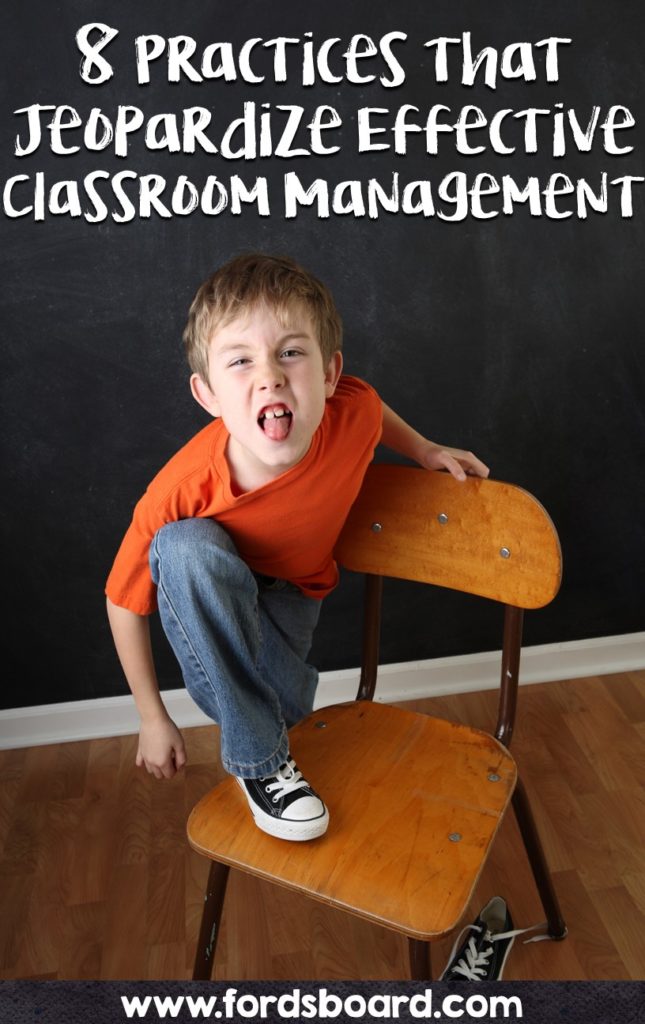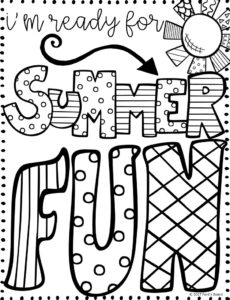I think it’s important to begin this post by letting you know I am a very effective classroom manager. It wasn’t always that way, though. When I first began my teaching career, there was a child in my class who made my life and everyone’s else’s life miserable. I decided to invite my mother, a school administrator, in from out of town (yes, she had to take a day off – I was that desperate!) to observe my class and give me feedback on areas I needed to improve upon. After observing my class, she looked at me and said, “Where there is no order, no learning can occur”. I’m sure she said a whole lot more, but throughout my career as a teacher, those are the words I remembered. After that, I made it my mission to be and do whatever I needed in order to maintain a classroom that ran smoothly and was conducive to positive student behavior.
Fast forwarding, I improved as a classroom manager to the point that wherever I taught, that’s what I was known for. Colleagues asked me how I did it. Parents asked me how I did it. Even administrators asked me how I did it. One of them said I had a magic dust that I sprinkled over all of my students! The truth is, effective classroom management is a daily commitment, a daily challenge, and a daily awareness that lasts the span of the entire school year. When many teachers are looking for ways to become better classroom managers, they try to figure out what to do. What behavior management system will I use? How will I reward my students? While these are important questions, the most important aspect of effective classroom management is THE TEACHER. Effective and ineffective classroom management is a reflection of who you are and what you believe as a teacher. I believe effective classroom management is characterized by what a teacher does…and does not do. Doing all the “right” things will not sustain a well managed classroom environment. Equal attention has to be given to what not to do. Based on my experience as a teacher and classroom manager, here are eight practices that I believe jeopardize effective classroom management:
Generalizing Expectations – Most of the first two weeks of school for my students involved what I can only describe as a unit in classroom expectations and procedures. Of course, the expectations were stated, but then there were role modeling activities, “What if…” scenarios, collaborative activities, etc. I also made sure to be very, very specific. For example, I am very clear with my students about the way in which I expect them to respond to me. I do not accept “What?” or “Huh?” as a response. Instead of just stating my expectations, I asked them what an appropriate response would be if an administrator buzzed my room. Would it be okay if I answered her with a “What” or Huh”? What about the tone of my voice? What would be an appropriate tone? The students would always say that I should be polite and use words like Yes or Yes Ma’am to respond instead of What. When I asked them why, they’d say because she was the leader of the school. Then I’d ask, “Who is the leader of the classroom?” Aha! Instead of generalizing my expectations and telling students they must be respectful, they understand why I’m requiring a certain behavior. In addition to stating, posting, and discussing rules, it is always necessary to dive deeper so students not only know, but understand the rationale behind rules.
Focusing on Things You Can‘t Control – You cannot effectively manage a group of students you do not truly accept and embrace. Children can see through teachers who don’t want them. As one of my principals used to say, “The parents don’t keep the good ones at home”. I always believed my class was the best class in the whole school…I really did! No matter who my students were or where they came from, they were incredible. I always reminded myself before the beginning of the school year, “You get who you get, and you don’t pitch a fit!”
Being Super Duper Nice or Super Duper Mean – If you are a person who is overly concerned with pleasing others, chances are effective classroom management will be difficult for you. It may be more important to you that your students like you and see you as a friend or favorite teacher, rather than an authority figure. Conversely, if you exhibit disrespectful behavior and tend to be harsh towards your students, your overbearing behavior will not likely attract the results you’re hoping for.
Avoiding Confrontation – Let’s face it. Some student behavior is downright scary. It’s not easy to deal with a student who is angry, disrespectful, and/or out of control. However, in order to be an effective classroom manager, it is necessary to follow through with whatever plan you have in place to deal with students in this situation. This may initially make the situation worse – the student’s behavior may escalate temporarily. However, by following through with effective behavior management strategies you are sending a message to the student that you will not be intimidated into accepting inappropriate behavior. Over time, students with disruptive behavior in well managed classrooms often realize that life at school is much better when they spend less time resisting and more time cooperating. In managing student behavior keep your focus on long term, not short term, results.
Compromising with Students – I always told my students, “You choose the behavior. I choose the consequence.” There was no compromise. I made it clear that I had no intention of trying to control 20+ students. “I’m outnumbered”, I would say. “If you choose to roll around on the floor all day, be disrespectful, not listen to your teacher, that is your choice…but there will be a consequence.” As promised, whenever a student chose a negative behavior, there was a consequence. I did not negotiate. I did not get emotionally involved. I simply enforced the consequence. Of course, different students require different consequences and it is necessary to consider fairness, but whatever you decide, follow through and avoid consulting with students on decisions that a teacher is responsible for making.
Neglecting to Address “The Little Things” – In my opinion, this is the main practice that jeopardizes effective classroom management. This happens when teachers choose not to address the minor behaviors, which ultimately lead to major behavior problems. If a student is allowed to be “a little disrespectful”, it won’t be long before that student is totally disrespectful. If a student is allowed to throw a pencil in anger, it may not be long before the same student is throwing a desk. Maintaining a state of awareness is the key to not allowing the little things to turn into big things. If you feel that a situation needs to be addressed, don’t doubt yourself. A talk with a student about something seemingly minor might prevent a disaster down the road!
Leaning Too Heavily on Administrators – Yes, there are times when it is absolutely necessary to write an office referral. Yes, there are times when it is absolutely necessary to get an administrator involved. Yes, there are times when a student needs to be removed from the classroom. However, in a regular education classroom this needs to be the exception, not the rule. Of course, the majority of teachers see administrative involvement as a last resort, but there are teachers who write referrals every week. Here is the message sent to students, administrators, parents, maybe even teachers themselves when teachers rely excessively on administration to address behavioral issues: I am not capable of managing my classroom.
Moving Away From Effective Practices – Effective classroom management has to be sustained over the long haul. It’s not something that can be modeled and practiced, then forgotten about after the first month of school. Whatever it takes to get students there is what it will take to keep them there!
I hope you can take something from this post that will help you continue or begin to be an effective classroom manager. Best of luck with your students this year!




